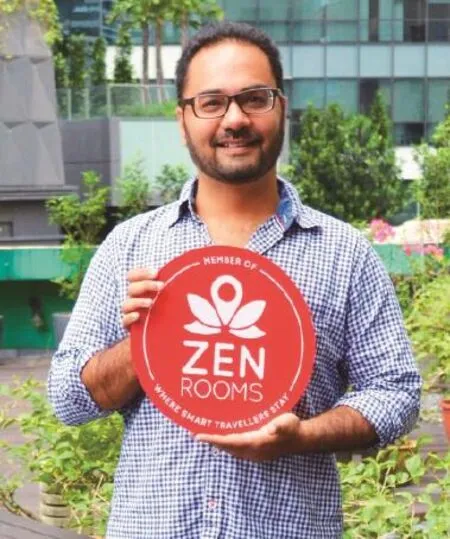东南亚创业者:抄不好才可耻
□ 文/亿邦动力网
东南亚创业者:抄不好才可耻
□ 文/亿邦动力网
创业公司“山寨模式”现象并不是中国专有,东南亚的电商也在山寨途中,例如这家在投入使用半年后就迅速覆盖了印尼、泰国、菲律宾、新加坡、马来西亚、斯里兰卡、巴西、中国香港等8个国家和地区的新兴在线酒店预订平台ZEN Rooms,就大大方方地承认是山寨印度酒店预订平台OYO Rooms。ZEN Rooms创始人对于山寨这事儿并不遮掩,他认为一个在印度、一个在东南亚,这已经是很大的差别了。
“偷师”印度,从印尼下手
ZEN Rooms定位为“酒店版的Uber”,是一个经济型酒店预订平台,可以看作轻模式的七天连锁,酒店加入平台之前需按照要求进行整改,至少要保证六项基本服务:干净的房间、舒适的床、独立卫浴、空调、WiFi、平板电视。“一家旅馆拿出5~10个房间,以ZEN Rooms的品牌的名义在平台上分销。我们负责质量审核和日常监督,赚取旅店佣金。” 联合创始人之一Kiren Tanna介绍说,“未来还会和其他旅行机构合作引入票务、接送等增值服务,但这些都不是眼下的重点。目前只是尽力想把酒店预订做好。”
ZEN Rooms是德国孵化器Rocket Internet(下文简称Rocket)继东南亚版天猫Lazada之后的新项目。Rocket素有“山寨大王”之称,其基本模式是将已被验证成功或可行的互联网商业模型复制到新兴市场,在当地取得领先地位。当然,ZEN Rooms也不例外,它抄的是印度的OYO Rooms。Kiren Tanna对此并不避讳:“我们和OYO Rooms做一样的事情,但我们是在东南亚,而OYO Rooms在印度。”
至于为什么选择东南亚市场,Tanna指出,东南亚的酒店市场集中度较低,连锁酒店大约只占10%。“印尼竞争稍微激烈一点,一些连锁品牌旗下数量达到了20~30家,但我们的酒店数量更多,价格也比它们便宜20~40%。”
不过,据了解,东南亚的在线酒店预订市场也已经逐渐有了火药味。ZEN Rooms的“老师”OYO Rooms目前融资金额已累计达1.26亿美元,2016年2月收购了竞争对手Zo Rooms,最近还扩张到了马来西亚,再加上硅谷知名孵化器500 Startups所投资的新加坡公司RedDoorz崛起,东南亚地区的经济型酒店预定平台的竞争日趋激烈。
Rocket式的跑马圈地
除了“山寨”,Rocket项目的另一个鲜明特点是快:迅速扩张,并为此制定严格的关键绩效指标(KPI)考核标准。据业内人士分析,这也符合孵化器的逻辑,“一般的创业者不会铺得太快,一定是在某个市场稳定后再慢慢来,但孵化器有变现压力,需要加紧跑业绩。”一位新加坡的电商创业者如是说。
Tanna透露,ZEN Rooms团队的KPI构成包括增长量、盈利能力和消费者满意度三个维度。“我们需要在这三个指标之间保持平衡。没错,跟其他创业公司一样,我们现在很费力地要完成这些指标,Rocket也提供了很多帮助。”Tanna说。
到底跑得有多快?据悉,ZEN Rooms2015年11月在印尼上线;2016年3月就一口气拿下4个亚洲市场;紧接着,4月宣布走出亚洲进入巴西。上线半年之后,ZEN Rooms已经覆盖了印尼、泰国、菲律宾、新加坡、马来西亚、斯里兰卡、巴西、中国香港等8个国家和地区。
谈到这些市场目前的表现情况,Tanna没有透露具体的业绩,只是简单概括:“所有市场都表现得很好,但还是处于早期阶段,还需要进一步观察。”虽然ZEN Rooms已经覆盖8个国家和地区,但实际上一共只开通了21个城市的服务,最多的印尼有8个城市,少的如马来西亚、菲律宾、新加坡、中国香港都只有一个城市;一共支持四个语种,包括英语、泰语、印尼语和葡萄牙语;在酒店数量上,其起家的印尼光在巴厘岛就有79家店,而巴西全国(里约热内卢和圣保罗)只有18家。
Tanna认为,对于ZEN Rooms来说,多市场经营十分有必要,东南亚有30~35%的旅行发生在地区以内。另一创始人Nathan Boublil在访问中进一步指出:“通常,去了印尼的游客也会去斯里兰卡、菲律宾、马来西亚等国家,已经有大量游客对我们提出了需求。”
另外,ZEN Rooms方面对自己在印尼的经营状况也十分有自信。“我们的KPI表现即便对于严苛的Rocket标准来说也极为出色,所以我们觉得是时候扩张了。”Boublil说,“从印尼市场我们了解到了游客需求的‘普遍共性’,例如,WiFi、空调、淋浴,而窗帘颜色基本没人关注。”
轻模式,不差钱?
两位创始人都强调,ZEN Rooms是轻模式,不烧钱。“我们不用租房,不用打扫,平均每个顾客住2.5晚,每晚花费20~22美元,和印尼的其他领域相比,这个的市场体量够大,”Tanna说,“如果我们能够控制好用户获取成本,靠佣金就能达到盈利。”

01 /带有ZEN Rooms标识的的酒店房间

02 /ZEN Rooms获得众多消费者追捧

03 /ZEN Rooms创始人之一:Kiren Tanna
相比Rocket Internet在东南亚的其他电商公司,ZEN Rooms确实较轻,但上线6个月覆盖8个国家和地区,尚未实现盈利,目前还在花Rocket给的种子轮融资,很难说“不差钱”。有业内人士猜测,ZEN Rooms连续攻城略地至少说明当下业绩不错,Rokcet可能会加持。还有业内人士分析,孵化器没有稳定的主营业务来支持投资,所以当项目亏损严重的时候也需要引进新的投资方。
“已经有一些投资人找到我们了,包括印尼的战略投资者和感兴趣的公司。会融资,但不是2017年,我们已经成功保持轻模式,而且一直十分小心地控制成本。”Boublil说。
本土化魔咒怎么破
ZEN Rooms目前有60~70个员工,总部设在新加坡。至于为什么第一站选择印尼,Tanna说,主观原因在于团队核心成员对当地比较熟悉,客观原因是由于有巴厘岛等著名景点,当地旅游市场庞大。
Tanna介绍,目前ZEN Rooms在印尼设有英语呼叫中心、订单处理中心,而线上推广、网站建设等则在新加坡进行。开拓新市场的时候,一般是从成功地区派出几个人的先遣部队到当地进行市场调研,招纳旅店,招收当地员工,来负责运营、财务、客服等本土化工作。
事实上,所谓“东南亚”只是一个地理统称,各国作为独立个体在政治、经济、文化等方面会有诸多不同。Tanna透露,目前开通的几个酒店市场就存在不少差异:就价格而言,新加坡和中国香港因为市场比较成熟,相对贵一些;在游客来源构成方面,印尼的国内需求更强,泰国的国际游客更多,菲律宾处在中游水平,韩国和日本游客多;在入口方面,60%的印尼用户访问来自移动端,安卓系统偏多;在支付方式上,印尼喜欢银行转账,其他国家喜欢信用卡。
针对区域市场的差异,ZEN Rooms也采取了本土化策略。例如,因为泰国人偏爱柜台交易,所以在当地推广线下交易的方式;部分印尼顾客不喜欢房费涵盖早点,所以ZEN Rooms把二者拆分开,顾客可自由选择。
“首先,我们从现有市场以及其他商业模型中吸取经验教训,不断地修正自身;其次,密切关注数据变化,了解什么样的价格或营销手段最有效;此外,还和当地旅店店主保持紧密联系,在多方面保持合作。”Tanna说。
・来源:亿邦动力网
ASEAN will celebrate its 50thanniversary this year as a momentous milestone for the region after fi ve decades of success and achievements. This remarkable year will be led by the Philippines as the new ASEAN chair country.
Proclaiming this year’s theme, “Partnering for Change, Engaging the World,” Philippine President Rodrigo Duterte pledged to promote ASEAN, home to more than 640 million people at different stages of economic development, as the ideal model of regionalism and as a global player with the interests of its people at its core.
During the handover of ASEAN chairmanship from Lao at the ASEAN Summit last September 8, the President promised to steer and guide the association to pursue initiatives and enhance cooperation with global partners, while retaining ASEAN’s centrality, unity and solidarity.
The 50thanniversary can become the starting point to prepare for new challenges that lay ahead in the region. As ASEAN chair and one of the founding members, the Philippines has the huge task of leading the region to better economic prospects, political stability and security amid major challenges within the country, within the ASEAN region and also in the wider world. Those challenges need to be faced and resolved simultaneously.
We can see that trade within ASEAN has been stagnant at between 20 percent and 24 percent over the last couple of years, even though the elimination of tariff barriers has been an important point on the agenda. Unimplemented measures and pending matters still exist in the second year of the ASEAN Economic Community (AEC), which started in 2015. These issues should be addressed more deeply, while ASEAN also tries to broaden its ambitions by endorsing the ASEAN Blueprint 2025 as a new milestone to be achieved.
Rising protectionism correlated with stagnating economic growth worldwide and growing unease over globalization creates a major setback to efforts of regional integration and could disrupt global supply chains.
In addition, business growth (for example in the digital economy) has lagged behind international commitments. Negotiations on a new global trade agreement have stalled. Progress on the Trans-Pacific Partnership has been abruptly ended after Trump’s victory, creating greater pressure for ASEAN to conclude negotiations on a Regional Comprehensive Economic Partnership agreement.
Adding extra weight to the chairmanship role, there have been problems in several member states (Indonesia is on that list) to abide by existing commitments or upgrade commitments made under the ASEAN and ASEAN+1 free trade agreements. The absence of an adequate dispute-settlement mechanism to address the problem makes matters worse.
The way to tackle these problems is by discussing them the “ASEAN Way”, which embraces solidarity rather than legal rigidity. Limited budgetary and human resources among all trade negotiators within the region are an additional burden to concluding talks in a timely manner.
ASEAN faces prominent economic challenges, such as the rising political and economic dominance of China, uncertainty and protectionism in the US under Trump, questions about Brexit and European stability as well as a possible global fi nancial crisis.
Taking into account a global economic crisis and challenges within the region, can ASEAN reach a higher level of integration during the Philippine chairmanship?
To achieve that objective, the Philippine government has proclaimed nine main deliverables to be achieved this year. They are regional self-certification of micro, small and medium enterprises (MSMEs), an ASEAN trade facilitation index, a focused and strategic action agenda on investment, conclusion of the ASEAN Trade in Services Agreement, a peer review for the AEC, ASEAN inclusive business, the ASEAN Declaration on Innovation, Women and Youth Entrepreneurship.
With a gross domestic product of US$ 2.6 trillion, the AEC is the seventh-largest economic block. With a population of more than 620 million, it is the third largest in Asia, after China and India. In this regard, the Philippines will highlight ASEAN MSMEs as the main drivers of inclusive growth in the region.
It’s very reasonable that the Philippines want to foster the development ofSMEs, since this can help overcome development barriers and stimulate national and regional economies. SMEs as a key driver and contributor to the GDP of ASEAN economies account for 95 percent to 99 percent of all business establishments and for 51 percent to 97 percent of employment in many ASEAN members.
The GDP contribution of SMEs is signifi cant at 23 percent to 58 percent, and their impact on exports ranges from 10 percent to 30 percent. By enhancing their market access, SMEs can take advantage of trade and investment opportunities and benefi t from regional economic integration.
However, most SMEs on a domestic and regional scale still struggle in their operations, which limit their capacity and make it difficult for them to compete internationally due to limited funds and resources, poor packaging, networking and marketing plans.
The question is, can those issues be solved? Quite simply, doubts still remain. In addition, there are growing fears about possible attempts to reject Duterte’s programs. Nevertheless, strong leadership is actually more needed now to give the region direction into becoming stronger and more stable. All members have to fully support the achievement of these deliverables. The responsibility to move forward with economic integration rests not solely with the chairman country; every ASEAN member country needs to share the burden to expedite process, support all agreed work plans and give supporting input to accelerate integration and resolve any remaining domestic and regional matters.
It is also crucial for all members to continue to find amicable solutions to remaining issues in order to prevent further gaps and establish a more effective dispute settlement mechanism to address future issues. All members should exploit all the foreseeable economic opportunities to avoid greater losses across the region. If these ideals can come be achieved, then surely we can rise to the next level.
· The writer is the deputy director for investment, SMEs, competitiveness and issues in the ASEAN Directorate of ASEAN Negotiation, Directorate General of International Trade Negotiation.
· The views expressed are her own.
· Source: The Jakarta Post
Can ASEAN Rise to the Next Level?
By Dina Kurniasari

Philippine President Duterte

